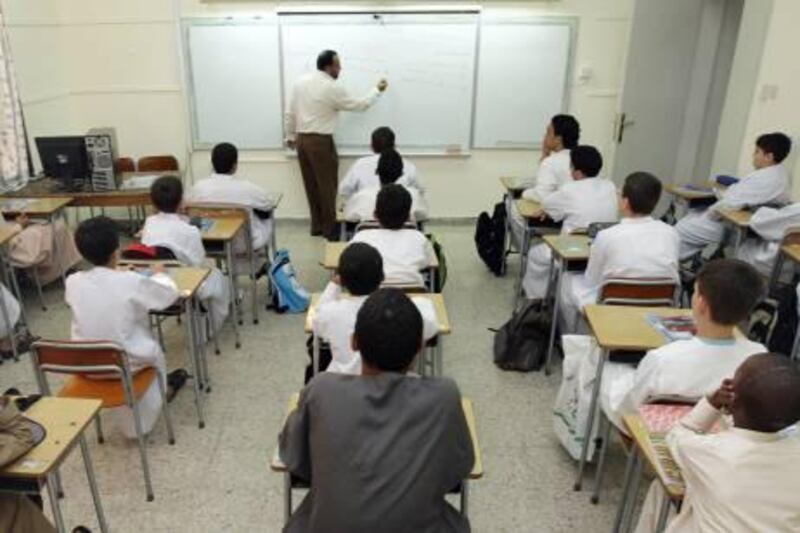ABU DHABI // Some parents who were unable to pay public school fees last year are still struggling to do so, despite the new payment plan announced by education authorities last week.
While Emirati children may attend public schools for free, the children of Arab expatriates must pay a small fee to attend.
In previous years, those who could not afford the public school fees would send their children to evening classes for less than a third of the cost of day school.
More than 7,000 students from low-income families were attending evening classes run by Abu Dhabi Education Council (Adec), each at a cost of between Dh2,200 and Dh3,200.
In February, near the end of the 2008/2009 academic cycle, a directive from Sheikh Mohammed bin Zayed, Crown Prince of Abu Dhabi and Deputy Supreme Commander of the UAE Armed Forces, called for an end to the budget evening classes.
Adec said the classes were damaging to both the teachers and students' capability.
Classes would start at 3pm and end at 8pm.
"The students were at school until late in the evening, which was tiring for them and interfering with their family time," said Mohammed Salem al Dhahiri, Adec's executive director of school operations.
A lack of teachers for the extra classes resulted in many of them working double shifts, he said.
The classes were officially cancelled in June, at the start of the 2009/2010 academic year.
When the classes were cancelled, authorities and charitable organisations in the emirate said they were considering ways to exempt students of low-income families from paying fees all together.
In the meantime, parents were offered a grace period and told that they would be allowed to pay night school fees for their children to attend day school classes.
However, many parents were still unable to pay the fees.
Last week, the Abu Dhabi Education Council (Adec) said parents would be able to pay off outstanding fees in three instalments.
"Adec wants to support the parents, and that is why we have made it easier for them," said Mr al Dhahiri. "I do not think the parents will have a problem paying the new fee structure."
But parents are now faced with paying the full day school tuition of Dh6,000 for this academic year and, for some, the additional outstanding amounts from last year.
Mr al Dhahiri said the fee structure for non-nationals at public schools is set out by the ministry and that Adec is following the regulations.
"The fees are far lower by comparison to private schools, and it includes transport costs as well. Education for children of government officials and teachers is also free."
Anas Talat, a high school student who was moved from evening classes in 2009, said his father is unemployed and that the increase adds pressure to the family.
"My parents were paying much less when I was enrolled in an evening school," he said. "That, too, was hard to pay and so the easy payment does not help my family."
He said his siblings also need to be educated and that he was looking for government support.
Anas said a social worker, who visited his school, told him he could apply at the Sheikh Khalifa bin Zayed al Nahyan Foundation for aid.
This year, the foundation paid tuition for 8,000 students in the country's public schools, including those enrolled in evening classes.
Mr al Dhaniri was unable to say whether there were further plans to support parents who are unable pay the new fee structure.
Emirati student Mohammed Saleh said many students at his school were struggling to pay the fees.
"If you come to our school, you'll see how many students are facing this problem," he said.
"Some of them are really good students and it would be wrong if they cannot study because of this."






